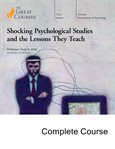Nonfiction
eAudiobook
Details
PUBLISHED
Made available through hoopla
EDITION
DESCRIPTION
1 online resource (1 audio file (3hr., 05 min.)) : digital
ISBN/ISSN
LANGUAGE
NOTES
Read by Thad A. Polk
We live in a time of amazing new technologies-and an unparalleled level of surveillance. Virtually every aspect of human behavior is tracked millions of times a day through the technology that we all, often without giving it a thought, use every day. The collected data has the potential of providing vital insight into the human experience, but can the scientific community explore the psychosocial experience of humanity without making victims of us all? Professor Thad Polk, of the University of Michigan, invites you to join him for Shocking Psychological Studies and the Lessons They Teach, a six-lecture course exploring a range of shocking psychological experiments from the past that have nonetheless contributed significant insight into the human condition. Dr. Polk elucidates the contemporary ethical principles now in place to protect both subjects and science, but admits that with every new technological and scientific advancement, there also comes a new set of ethical conundrums for researchers to grapple with. Psychological research today adheres to the Belmont Report's principles, a set of three ethical principles established in 1976 following the aftermath of research studies that critically failed to protect the rights of the research subjects. Through a look at a series of influential, but flawed, studies, ranging from syphilis to stuttering to psychoactive drugs, Professor Polk explores these ethical principles and how they, in retrospect, might have been applied. As he concludes Shocking Psychological Studies and the Lessons They Teach, Professor Polk acknowledges that as science still grapples with the ethics of studying human subjects, past mistakes have helped us to create a safer and more enlightened field of scientific research, adhering to ethical research principles
Mode of access: World Wide Web







